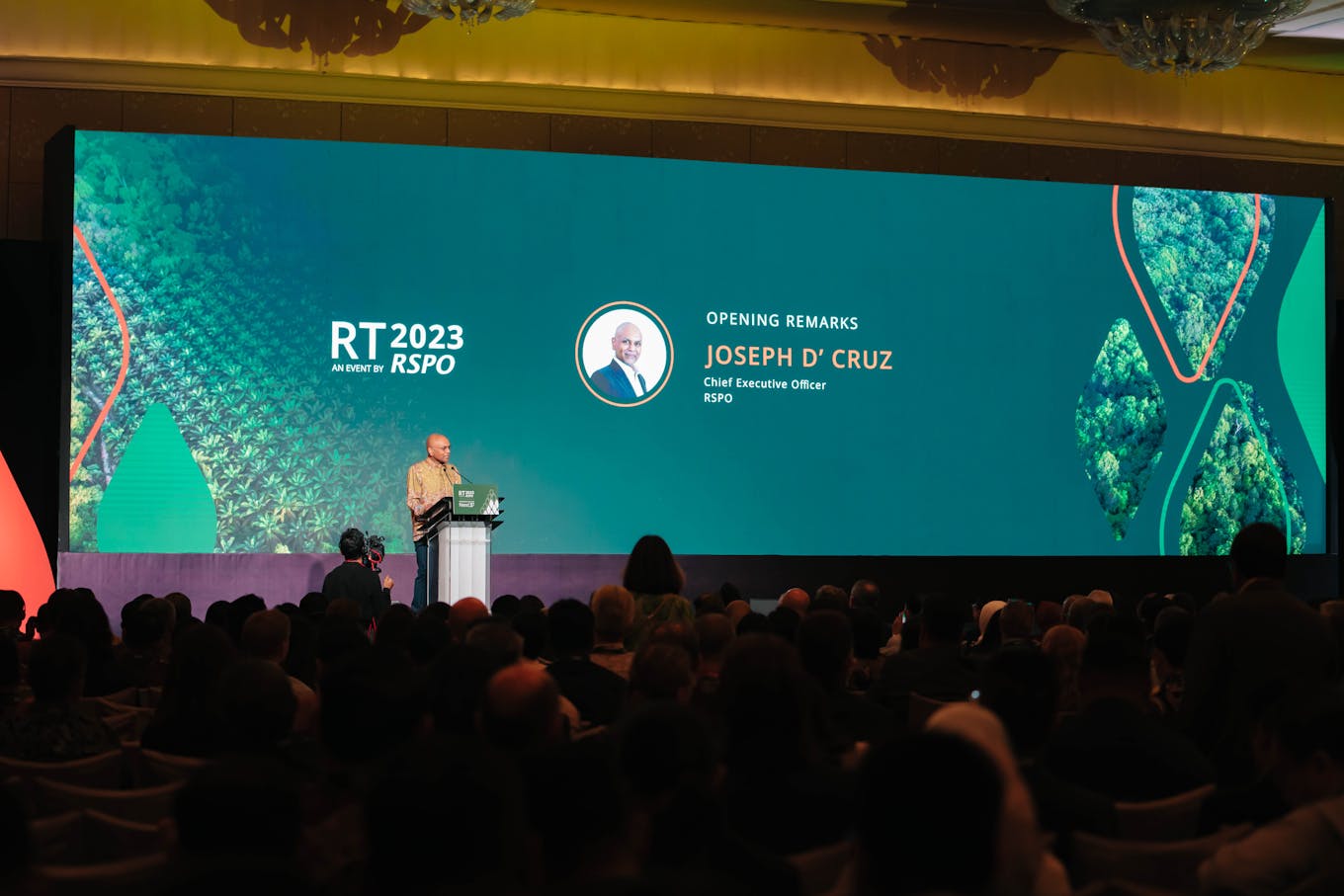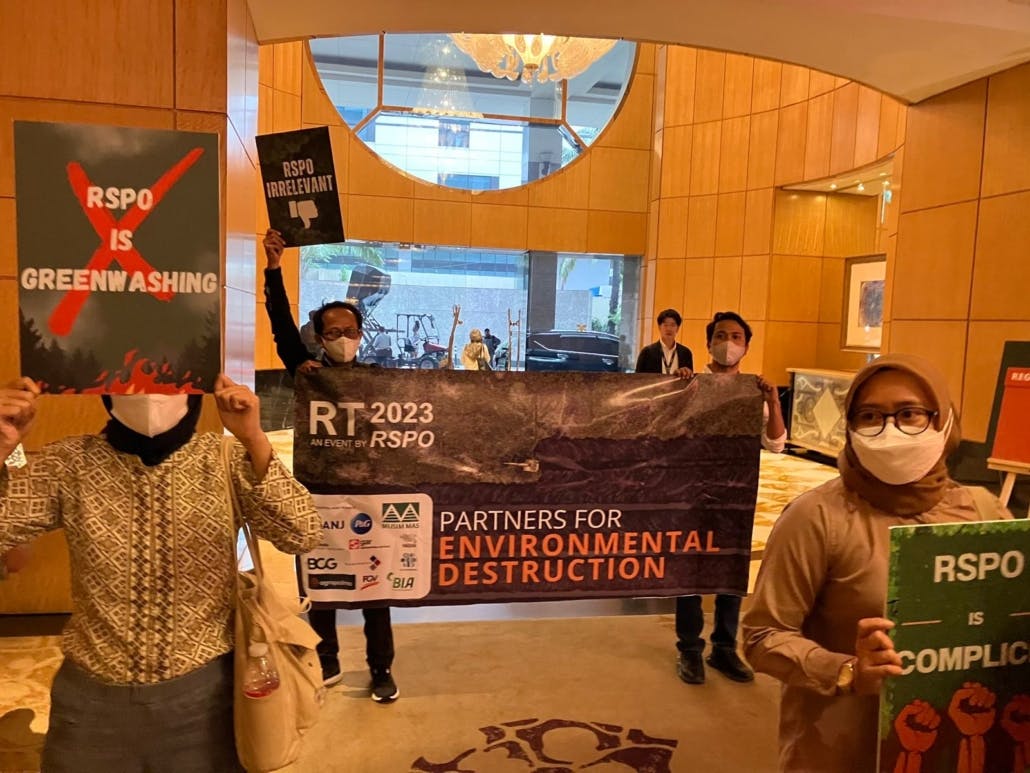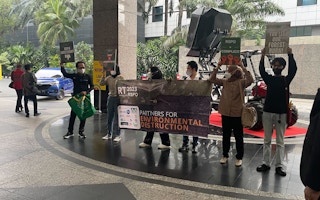Twenty years after its inception, the Roundtable on Sustainable Palm Oil (RSPO) has come face to face with a pressing need for change.
New and evolving global regulations for sustainability reporting is requiring members to demonstrate “sustainability beyond certification”, said Joseph D’Cruz, chief executive officer of the world’s most prominent standard-setter and certification body for sustainable palm oil.
“The reality is that markets, regulators and consumers are no longer willing to accept a certificate as full and final proof of sustainability,” D’Cruz told attendees at the RSPO’s annual conference, held at the end of November in Jakarta.
Among new requirements is the European Union’s regulation on deforestation-free products (EUDR), which came into effect in June this year. Although RSPO-certified growers are required to make disclosures similar to those required under the EUDR, there remain technical and fundamental gaps between the certification and the legislation, internal analysis showed.
In response, RSPO envisions its standards and certification scheme evolving into “a more flexible, modular and adaptive system,” said D’Cruz. The intention is to help members provide more “fine-grained and tailored” sustainability information to those who demand it, with RSPO acting as a vehicle for palm oil producers and buyers to connect with the various sustainability frameworks and platforms.
However, talk of a flexible and modular system has raised alarm bells for forest protection groups such as the Rainforest Action Network (RAN). The network has been investigating deforestation in Indonesia and beyond for about 15 years, and looks specifically at land use industries such as palm oil as well as pulp and paper.
“That was the one thing I heard from (D’Cruz’s) speech that made me go: ‘What? This is going to be a disaster,’” RAN policy director Gemma Tillack told Eco-Business. She worried that this approach would make the standards appear like an “opt-in process, where companies can just pick which bit they are going to comply with.”

As the Roundtable on Sustainable Palm Oil celebrated its 20th anniversary, chief executive Joseph D’Cruz called on members to work together on to define what sustainability is in the palm oil sector. Image: RSPO
The new approach is especially concerning to Tillack as RSPO is currently in the midst of a standards review, which takes place every five years and is due to be published in mid-2024. RSPO last published its revised Principles and Criteria in 2018, in which it included the No Deforestation, No Peatlands and No Exploitation (NDPE) benchmark that RAN and other forest protection groups have campaigned for since 2013.
“We have heard from people involved that there have been efforts to weaken the standard during its revision process,” said Tillack. “We have reached out to individual members, but they have gotten back to us saying that they are not allowed to talk about what’s going on [during the standards revision].”
RAN is not a member of RSPO, and as such not privy to the ongoing discussions. However, Tillack said that the air of secrecy is itself a concern, as observers would like to be aware of what key issues are being addressed in the revision.
RAN believes RSPO’s current standards are still relevant in prohibiting deforestation and peatland development in the palm oil industry, as well as defending labour and land rights. In a press statement released days before the RSPO conference, the network called on the certifying organisation to maintain and enforce its NDPE policy. “The standard must not be weakened to enable violations of land rights (or) deforestation in intact forest landscapes in high forest countries,” it said. Tillack said that the network has also formally submitted its recommendations to RSPO.
In response, RSPO said that the no-deforestation principle is one of the key principles of its certification and it will not be watered down. “The Standards Review Task Force has agreed that the 2005 cut-off year for no deforestation is upheld, regardless of geographical location,” it told Eco-Business in an email. “The current revision is looking at a more holistic and practical approach towards achieving no deforestation, taking into consideration the livelihoods of smallholders, local communities and Indigenous Peoples.”
“Voluntary sustainability standards such as RSPO could be more effective by being inclusive instead of exclusive, and cater to different realities on the ground,” said RSPO.
The organisation also said that elements of modularity are already embedded in its existing principles and criteria, specifically through its national interpretation procedure. The procedure allows RSPO members to adapt their practices in line with local laws and cultural norms, while “holding true to the spirit of the principles and criteria without dilution,” it said.
Converting the sector
Weak enforcement of local legislation has occasionally failed sustainable palm oil standards, argued civil society organisations. Labour rights group Transformation for Justice (TuK) Indonesia, which staged a protest at the conference, alleged that RSPO members have continued to plant oil palms in deforested areas and have neglected to fulfil their legal plasma obligations to smallholders. In a statement, they alleged that at least 25 large companies controlling some 3.9 million hectares of plantation land in Indonesia are linked to illegal oil palm plantations in forested areas.
“RSPO has become a legitimising tool for the palm oil industry’s environmental destruction, human rights abuses and land grabbing,” said TuK Indonesia director Linda Rosalina. RSPO has not responded directly to the group’s accusations.
TuK Indonesia cited the case of recent protests in the Seruyan regency of Central Kalimantan by villagers, one of which turned violent in October as a protester was killed by police fire and several others injured. They were protesting the lack of plasma allocation by plantation firm Hamparan Masawit Bangun Persada, an affiliate of the BEST Group. In the same region, locals have protested the operations of Buana Artha Sejahtera company, a subsidiary of RSPO-certified Sinar Mas.

Instead of relying on voluntary sustainable palm oil certification, efforts should be made to improve national legislation on land rights, no-deforestation and labour, said representatives from TuK Indonesia. Image: Samantha Ho/ Eco-Business
“We read that the Seruyan regency has been granted jurisdictional certification by RSPO, just a month after someone passed away after being shot by police in a protest against a palm oil company (in the region). Imagine this happening against a backdrop of conversations about sustainability and human rights. It doesn’t make sense,” said a TuK Indonesia representative at the protest.
Instead of relying on the RSPO as a bulwark of sustainability in the palm oil sector, the representative said that efforts should be focused on improving national legislation surrounding deforestation and land rights.
Tillack was particularly worried about potential deforestation in countries such as Papua New Guinea and Liberia, where there is still high forest cover and established companies are seeking to expand palm oil production. She feared that making policies more modular would weaken NDPE benchmark in these locations to enable clearing of forests by indigenous communities, a problem that is exacerbated in countries which lack a strong legal framework and enforcement to protect land rights.
RSPO’s modular approach, which is being presented to the board for approval, is aimed at helping both members and non-members tackle the most critical issues first, said the roundtable’s director of transformation Inke van der Sluijs. “In some regions that would be land title rights, for which we need better engagement with governments. In other regions, that would be water use.” Deforestation, she added, was no longer the biggest issue in the world’s biggest palm oil producing countries, Indonesia and Malaysia.
“RSPO’s standard is a solid and holistic one, but it is a lot for growers to comply with,” she admitted to Eco-Business in an interview. “We have to have to be more flexible. We always thought we wanted to be one-size-fits-all but now we (realise) that will not help us convert the entire sector.”
These conversations are taking place against a backdrop of the organisation’s efforts to increase its global market share of certified sustainable palm oil, which has held steady at just 20 per cent of global volume produced in recent years.
Not waiting to be criticised
While criticisms in recent years are directed at how new sustainability reporting directives and trade regulations such as the EUDR would render the RSPO irrelevant, van der Sluijs said that the gap between the two is more a matter of information flows rather than compliance.
Both EUDR and RSPO require geospatial data of palm oil plantations to prove that companies are not planting trees in deforested areas. However, RSPO does not currently require growers and auditors to transfer this information to buyers. The EUDR, on the other hand, places the burden of proof on the importers to demonstrate that their supply chain is deforestation-free.
“The way that (palm oil producers) provide information is going to change,” said van der Sluijs.
To this end, RSPO has commissioned the development of a digital certification, trade and traceability system, scheduled for launch by the end of 2024. The system will act as a platform to convey information on where, how and by whom a palm oil product is produced, explained D’Cruz.
“Data and information are the foundation of our value proposition, and we are investing significant effort and resources in building digital infrastructure to unlock this value,” he said.
D’Cruz also called on RSPO members to define what sustainability means for the palm oil sector, instead of being driven by external criticism.
“Over and over again, we see the sustainability agenda for our industry being set by others,” he said. “Rather than waiting to be questioned and criticised, let us work together, in the RSPO fraternity, to agree on what lies ahead for sustainable palm.”

















